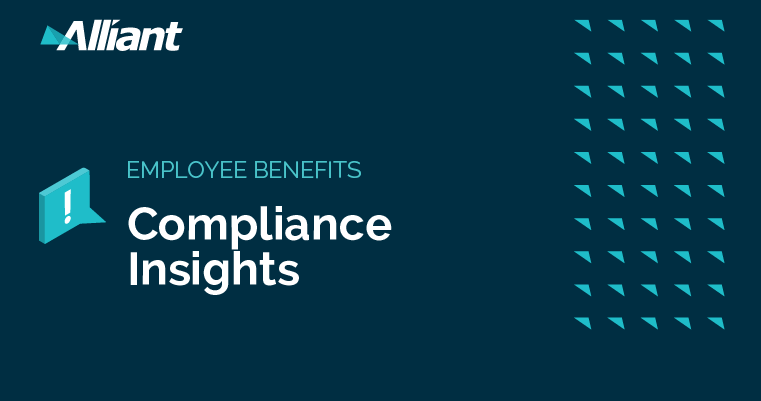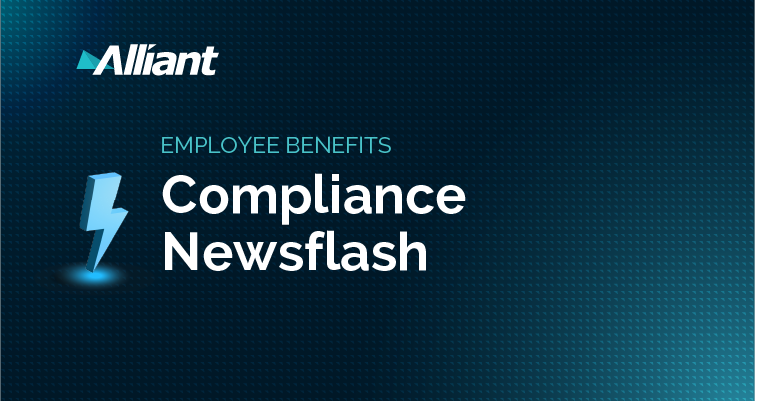Supreme Court Overrules Chevron Doctrine: Practical Implications for Group Health Plans
By Alliant Employee Benefits Compliance / July 02, 2024
Overview
On June 28, 2024, the United States Supreme Court issued its opinion in two companion cases, Loper Bright Enters. v. Raimondo, and Relentless, Inc. v. Department of Commerce, in which it the Court overturned the Chevron doctrine (Chevron U.S.A., Inc. v. Natural Resources Defense Council, Inc.). The Chevron case held that courts must defer to a federal agency’s position on the law when a statute is open to interpretation. To fully understand the issue here, a brief civics refresher can help. Recall that after Congress has passed a statute, it is common for a federal agency to issue regulations to interpret and implement that statute. Those regulations constitute the federal agency’s position on the law Congress has passed. While the Loper Bright and Relentless cases do not directly address group health plan mandates, employer plan sponsors should be aware of what the decision could mean in a larger context. While there is no immediate impact to health and welfare regulations, the opinion in Loper Bright and Relentless could have implications for employer plan sponsors in the future. Group health plans are subject to myriad federal agency regulations, many of which have already been the subject of legal challenges and are now arguably more susceptible to legal challenges as a result of this decision.
Background
The Chevron case, decided in 1984, articulated a two-step approach for a court hearing a challenge to an agency's interpretation of a law. The first step was to discern whether Congress had directly spoken to the precise question at issue in the statute. If the statute is clear, the court must give effect to that statute. If not, the second step would have the court defer to the federal agency if it had offered a permissible interpretation of the statute.
Loper Bright and Relentless Decision
The recent decision in Loper Bright and Relentless rejects the Chevron two-step approach based largely on separation of powers concerns. A detailed review of the Court’s opinion exceeds the scope of this discussion, but in essence the Court concluded that courts, not agencies, should decide “all relevant questions of law” where laws written by Congress are ambiguous, even where the relevant agency—an arm of the Executive Branch—has provided guidance on the matter. Despite this dramatic shift, the Supreme Court made clear that any prior decisions relying on the Chevron doctrine are not overturned.
Implications for Group Health Plans
It is difficult to predict the impact this decision may have on employer plan sponsors and certainly there are no immediate action items.
Employers should continue to rely on and comply with agency regulations unless and until a court overturns them, which is almost always a very long process. Agency guidance that stems from explicit statutory authority, such as reporting and disclosure requirements under ERISA, will be hard to challenge.
As for the implications of the Supreme Court’s decision for employer plan sponsors, we know two things: (1) Employers are subject to regulations issued by a number of federal agencies-- Equal Employment Opportunity Commission (EEOC), Department of Labor (DOL), Occupational Safety and Health Administration (OSHA), and National Labor Relations Board (NLRB), the Department of Health and Human Services (HHS), the Centers for Medicare and Medicaid Services (CMS), to name a few, and (2) the Loper Bright and Relentless decision makes it easier to challenge agency regulations. Given the turbulent history of the Affordable Care Act, as well as existing challenges to certain provisions of the ACA, it is likely that ACA-related regulations will be the subject of future challenges at the very least.
Though only time will tell, employer plan sponsors should prepare themselves for what could be a volatile legal landscape in the future and the possibility of different requirements in different states. It especially important now, more than ever, for employer plan sponsors to ensure they are working with trusted partners that will navigate them through what could be an ongoing shifting legal and regulatory landscape. Alliant will continue to monitor the outcome of the decision and provide updates if any additional information becomes available.
To download this article, click here.
Disclaimer: This material is provided for informational purposes only based on our understanding of applicable guidance in effect at the time and without any express or implied warranty as to its accuracy or any responsibility to provide updates based on subsequent developments. This material should not be construed as legal or tax advice or as establishing a privileged attorney-client relationship. Clients should consult with and rely on their own independent legal, tax, and other advisors regarding their particular situations before taking action. These materials and related content are also proprietary and cannot be further used, disclosed or disseminated without express permission.
More Compliance News



